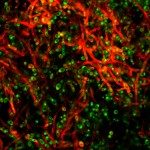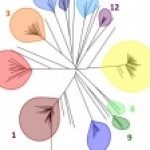Mélanie Legrand est une chercheuse permanente intégrée à l’unité Biologie et Pathogénicité Fongiques. Mélanie Legrand a obtenu son Master à l’Université du Minnesota, où elle a étudié la reproduction chez Candida albicans et Candida dubliniensis, des champignons pathogènes de l’Homme, dans le laboratoire du professeur Paul Magee. Elle a obtenu son doctorat sur la réparation de l’ADN chez C. albicans auprès du Dr David Kirkpatrick à l’Université du Minnesota. Elle a ensuite rejoint l’Unité Biologie et Pathogénicité Fongiques dirigée par le professeur Christophe d’Enfert à l’Institut Pasteur pour étudier les mécanismes moléculaires impliqués dans le maintien de l’intégrité du génome de C. albicans. Elle a obtenu un poste permanent INRA en 2010. Elle s’intéresse à la biologie générale de C. albicans, à la dynamique de son génome, ainsi qu’aux mécanismes de sa reproduction. Elle dirige actuellement un projet d’identification des régulateurs de la «perte d’hétérozygotie» chez C. albicans et contribue également au projet ORFeome de C. albicans.
Cliquez pour voir le graph
Connexions
Cliquez pour voir la ligne de temps
Ligne de temps
Projets
Publications
Télécharger-
2024Metabolic reprogramming during Candida albicans planktonic-biofilm transition is modulated by the transcription factors Zcf15 and Zcf26., PLoS Biol 2024 Jun; 22(6): e3002693.
-
2023The pathogenic and colonization potential of Candida africana., Microbes Infect 2023 Sep; (): 105230.
-
2022A phylogenetically-restricted essential cell cycle progression factor in the human pathogen Candida albicans., Nat Commun 2022 Jul; 13(1): 4256.
-
2022Multiple Stochastic Parameters Influence Genome Dynamics in a Heterozygous Diploid Eukaryotic Model., J Fungi (Basel) 2022 Jun; 8(7): .
-
2021Factors that influence bidirectional long-tract homozygosis due to double-strand break repair in Candida albicans., Genetics 2021 Mar; (): .
-
2020The impact of the Fungus-Host-Microbiota interplay upon Candida albicans infections: current knowledge and new perspectives., FEMS Microbiol Rev 2020 Nov; (): .
-
2020Use of CRISPR-Cas9 To Target Homologous Recombination Limits Transformation-Induced Genomic Changes in Candida albicans., mSphere 2020 09; 5(5): .
-
2020Identification and Characterization of Mediators of Fluconazole Tolerance in Candida albicans., Front Microbiol 2020 ; 11(): 591140.
-
2019Candida albicans: An Emerging Yeast Model to Study Eukaryotic Genome Plasticity, Trends Genet. 2019 Apr;35(4):292-307.
-
2019Identification of Recessive Lethal Alleles in the Diploid Genome of a Candida albicans Laboratory Strain Unveils a Potential Role of Repetitive Sequences in Buffering Their Deleterious Impact, mSphere 2019 02;4(1).
-
+Voir la liste complète de publications


